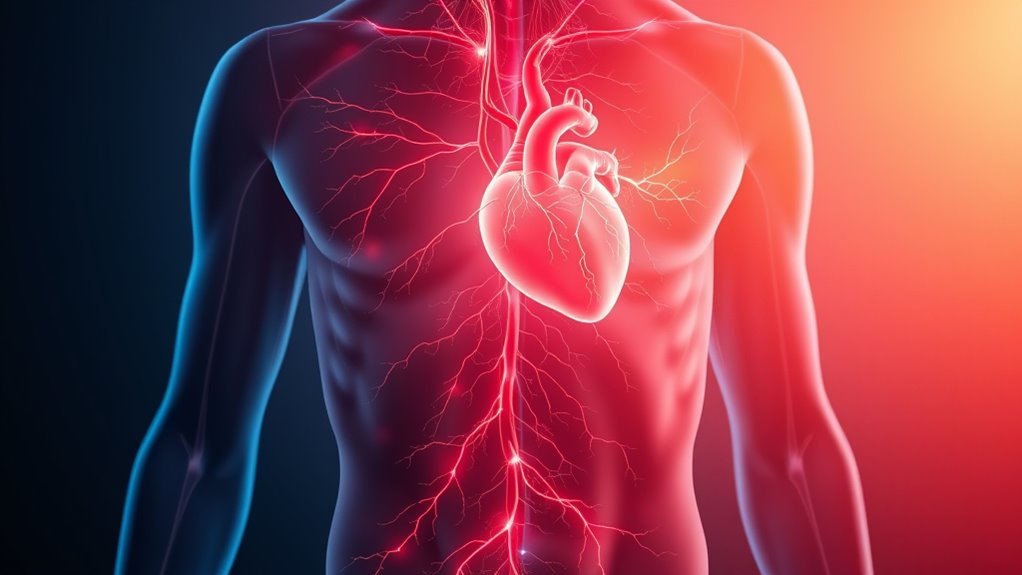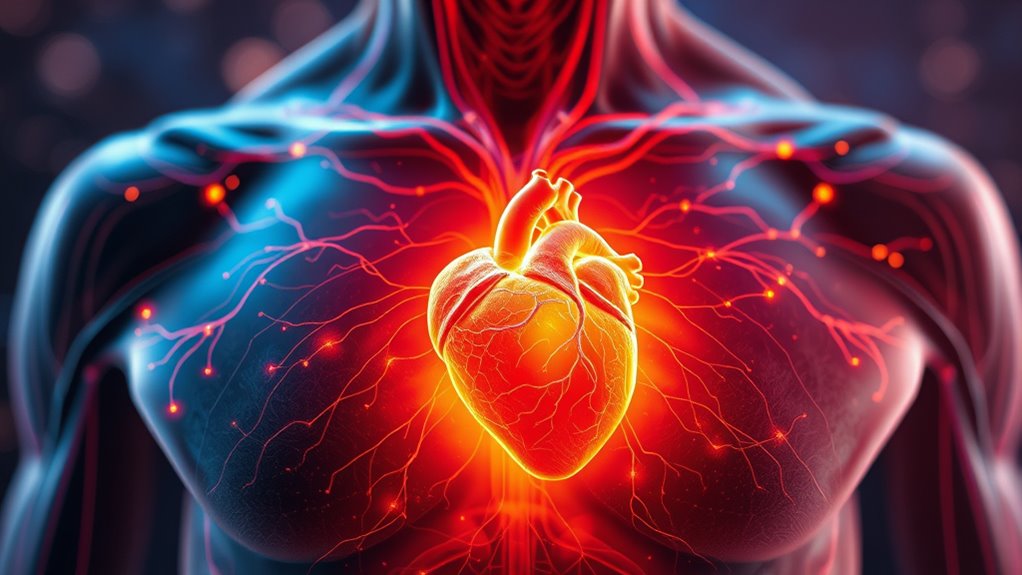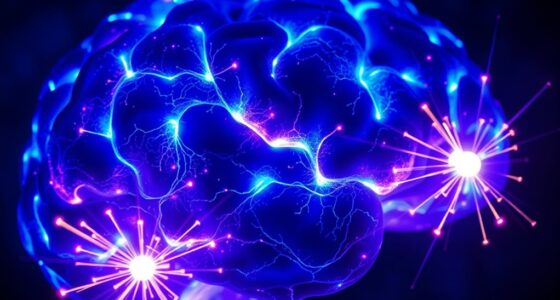Heart-brain coherence is a scientifically supported process where harmonious communication between your heart and brain boosts emotional stability, physical health, and mental clarity. Your heart sends electrical signals and hormonal messages that influence your neural pathways, especially via the vagus nerve. When these systems work together effectively, you experience better resilience, calmer emotions, and improved overall well-being. Exploring how to cultivate this connection can reveal powerful tools for enhancing your health—so keep exploring to discover more.
Key Takeaways
- Heart-brain coherence involves harmonious communication via neural pathways, hormonal signals, and feedback loops, promoting emotional and physiological balance.
- Heart rate variability (HRV) reflects autonomic nervous system health and resilience, indicating the level of heart-brain synchronization.
- Techniques like mindful breathing and gratitude enhance heart-brain coherence by activating the parasympathetic nervous system.
- The vagus nerve facilitates heart-brain communication, supporting relaxation, emotional regulation, and inflammation reduction.
- Maintaining heart-brain coherence improves emotional resilience, physical health, and overall well-being through optimized neural and hormonal interactions.
Understanding Heart‑Brain Communication

The heart and brain continuously exchange information through a complex communication network that influences your overall well-being. This interaction primarily occurs via neural pathways, which transmit electrical signals between the two organs. These pathways help your brain interpret signals from your heart, such as changes in heart rate and rhythm, informing your emotional and physical states. Additionally, hormonal signaling plays a crucial role, as hormones like oxytocin and adrenaline are released in response to emotional stimuli, affecting both your heart and brain. This intricate feedback loop enables your body to adapt quickly to stress or relaxation, fostering resilience. Understanding these mechanisms reveals how your heart and brain work together seamlessly, shaping your emotional health and physiological balance. Recognizing the spiritual and emotional significance of heart-brain coherence can further deepen your awareness of overall wellness. Exploring the neurochemical signals involved offers insight into how these systems influence mental health and emotional regulation.
The Science of Heart Rate Variability

Heart rate variability, or HRV, reflects how your nervous system responds to stress and relaxation. By understanding HRV basics, you can gauge your body’s balance between the sympathetic and parasympathetic nervous systems. This awareness can also reveal how emotional health and well-being are interconnected with your autonomic function. Regular monitoring of HRV can provide insights into overall autonomic nervous system health and help identify early signs of imbalance. Recognizing the impact of stress management techniques can further enhance your autonomic balance and emotional resilience.
Heart Rate Variability Basics
Understanding heart rate variability (HRV) involves recognizing how your heart’s rhythm changes from moment to moment. HRV reflects your autonomic nervous system’s balance and adaptability. To measure HRV, pulse measurement is commonly used, capturing the time between beats for rhythm analysis. Higher variability indicates a flexible, resilient heart, while lower variability suggests stress or imbalance. Forsale 100 Knowing your HRV can also help you monitor overall well-being and stress levels. Additionally, understanding the emotional safety provided by a supportive environment can positively influence HRV and overall heart-brain coherence.
Here’s a quick visual:
| Aspect | Explanation | Significance |
|---|---|---|
| Pulse measurement | Tracking beat-to-beat intervals | Determines HRV |
| Rhythm analysis | Examining timing between beats | Reveals autonomic function |
| Variability level | Range of fluctuation in heart rate | Indicates stress or resilience |
Understanding these basics helps you harness HRV for better health and heart-brain coherence.
Indicators of Autonomic Balance
Monitoring your heart rate variability provides valuable insights into your autonomic nervous system’s balance. When HRV is high, it indicates strong autonomic regulation, with your parasympathetic nervous system actively supporting relaxation and recovery. Conversely, low HRV suggests diminished autonomic flexibility, often linked to stress or compromised cardiovascular health. Regularly evaluating your HRV helps you identify shifts in autonomic balance, guiding lifestyle adjustments to enhance resilience and overall well-being. Elevated HRV is associated with better cardiovascular health, indicating your body can efficiently adapt to stressors. Incorporating sound healing science practices can further support your autonomic nervous system’s balance. By paying attention to these indicators, you can support your heart-brain coherence and foster a healthier, more balanced autonomic nervous system. This awareness empowers you to make informed choices for long-term health and vitality. Understanding heart rate variability as a key biomarker allows for targeted interventions to optimize your health.
Impact on Emotional Health
Since variations in heart rate variability (HRV) directly influence your emotional state, paying attention to these fluctuations can considerably impact your mental well-being. Higher HRV indicates better adaptability, helping you manage stress and recover from emotional setbacks more effectively. Practices like mindfulness meditation can improve HRV, fostering greater emotional resilience. When you focus on your breath and stay present, you activate your parasympathetic nervous system, which stabilizes your heart rhythms and promotes calmness. As your HRV becomes more balanced, you’ll notice enhanced mood, reduced anxiety, and increased capacity to handle life’s challenges. Additionally, understanding the horsepower of electric dirt bikes can inspire you to pursue new physical activities that boost your overall health. By cultivating awareness of your heart’s signals, you strengthen your emotional health, creating a positive feedback loop that supports overall mental wellness and resilience over time. Recognizing the benefits of hydration can further optimize your autonomic nervous system and heart function, contributing to emotional stability.
The Role of the Vagus Nerve in Heart‑Brain Interaction

The vagus nerve plays a crucial role in connecting your heart and brain, acting as a key communication pathway between the two. It forms part of the neural pathways that transmit signals influencing heart rate, mood, and overall coherence. When your vagus nerve is active, it promotes relaxation and enhances heart-brain harmony. You can strengthen this connection through practices like deep breathing and meditation, which stimulate the vagus nerve. The table below highlights some key aspects of its role:
| Function | Impact on Heart‑Brain Interaction | How to Enhance |
|---|---|---|
| Regulates heart rate | Promotes coherence | Breathing exercises |
| Sends afferent signals | Affects emotional responses | Mindfulness |
| Influences inflammation | Supports emotional health | Cold exposure |
| Controls parasympathetic activity | Reduces stress | Meditation |
| Maintains neural pathways | Facilitates heart-brain communication | Yoga |
How Emotions Influence Heart‑Brain Coherence

Emotions have a powerful influence on your heart-brain coherence, directly affecting how well these two systems communicate. When you experience strong feelings like stress or joy, your heart’s rhythm can become irregular, disrupting coherence. This impact can challenge your emotional resilience and make mood regulation harder. To better understand this, consider:
- Negative emotions like anger or fear often decrease coherence, impairing clear communication between your heart and brain.
- Positive emotions, such as gratitude or compassion, enhance coherence, supporting emotional resilience.
- Practicing mindfulness or gratitude can help you regulate mood, strengthening heart-brain harmony even during emotional upheavals.
- Incorporating wall organization systems can create a calming environment that promotes emotional balance and mental clarity.
- Developing awareness of aura colors, such as a purple aura associated with heightened spirituality, can also contribute to emotional and spiritual harmony.
Techniques to Cultivate Heart‑Brain Harmony

To cultivate heart-brain harmony, you can use simple yet effective techniques that foster calmness and emotional balance. Mindful breathing is a powerful tool—focus on slow, deep breaths, paying attention to each inhale and exhale. This practice helps activate your parasympathetic nervous system, promoting relaxation and emotional stability. Incorporating gratitude practices also enhances heart-brain coherence; take a moment each day to reflect on things you’re thankful for. This shift in focus encourages positive emotions, reducing stress and fostering a sense of connection. Additionally, understanding the importance of regular maintenance and proper cleaning techniques can prevent issues that might disrupt your emotional balance and overall well-being. Engaging in mindfulness through unplugging from technology encourages presence and connection with nature. Journaling dreams enhances memory and facilitates interpretation, aiding in personal and spiritual growth. Phantom smells and hearing bells at night may signify spiritual presence or messages, contributing to the meditative experience. Together, mindful breathing and gratitude practices create a ripple effect, aligning your heart and brain, and strengthening your overall emotional resilience. These techniques are accessible and can be integrated into your daily routine effortlessly.
Benefits of Achieving Heart‑Brain Coherence

When you achieve heart-brain coherence, you can experience greater emotional stability and resilience. This harmony also supports your physical health, helping your body function more effectively. As a result, you may notice improvements in your overall well-being and daily performance. Additionally, understanding wealth dynamics can motivate you to develop healthier financial habits that contribute to your sense of stability. Cultivating heart-brain coherence can also foster a deeper sense of inner calm and mental clarity, enhancing your ability to make balanced decisions throughout the day.
Enhanced Emotional Balance
Achieving heart-brain coherence can substantially enhance your emotional balance, allowing you to respond to life’s challenges with greater calm and clarity. When you practice mindful breathing, you activate your parasympathetic nervous system, promoting relaxation. This shift helps strengthen your emotional resilience, making it easier to bounce back from stress. As you develop this coherence, you’ll notice:
- Improved mood and reduced feelings of anxiety or frustration
- Greater clarity in decision-making during emotional situations
- A more stable, balanced emotional state even amidst chaos
- The ability to interpret and respond to emotional stimuli more accurately through color accuracy, further supporting emotional well-being
Additionally, maintaining awareness of angel numbers and their messages can serve as subtle cues for emotional guidance and reassurance during various life experiences.
Improved Physical Health
Improved physical health is a significant benefit of achieving heart-brain coherence, as it helps regulate essential bodily functions. When your heart and brain are in sync, your nervous system functions more efficiently, supporting better digestion and mindful eating. This connection encourages you to make healthier food choices and avoid emotional eating triggers. Additionally, heart-brain coherence enhances sleep quality by reducing stress and calming your mind before bed. When you experience a coherent heart-brain state, your body relaxes more easily, leading to restorative sleep. Over time, this balance can boost your immune system, increase energy levels, and promote overall well-being. Cultivating heart-brain coherence may also positively influence your pinball machine weight, making it easier to move and install your equipment safely. Developing heart-brain coherence can also support stress reduction, contributing further to your physical health. By cultivating heart-brain coherence, you take proactive steps toward maintaining ideal physical health and resilience.
Future Directions in Heart‑Brain Research

Future research in heart-brain coherence aims to deepen our understanding of how these systems interact and influence overall well-being. With recent neuroscience advances, scientists are exploring the neural pathways that connect the heart and brain more precisely. Technological innovations, such as wearable devices and real-time monitoring, enable you to track your heart-brain interactions daily. Moving forward, research will likely focus on:
Future research will advance real-time heart-brain coherence measurement and personalized health interventions.
- Developing more sophisticated tools to measure coherence in real time.
- Uncovering new mechanisms behind emotional regulation and resilience.
- Applying findings to personalized interventions for mental and physical health.
These advancements will help you harness heart-brain coherence to improve overall health, emotional balance, and cognitive function, making this an exciting frontier for future wellness strategies.
Frequently Asked Questions
How Does Heart-Brain Coherence Affect Mental Health?
Heart-brain coherence improves your mental health by enhancing emotional regulation and cognitive resilience. When your heart and brain are in sync, you can better manage stress, reduce anxiety, and stay focused. This connection helps you respond calmly to challenges and recover faster from emotional setbacks. By cultivating heart-brain coherence, you strengthen your overall mental well-being, making it easier to maintain a positive outlook and handle life’s ups and downs effectively.
Can Heart-Brain Coherence Be Measured Outside a Lab Setting?
You might wonder if heart-brain coherence can be measured outside labs. The good news is, yes—you can monitor it using wearable devices that track your heart rate variability and other essential signs. These gadgets enable real-time monitoring, giving you insights into your coherence levels on the go. While not as precise as lab equipment, they provide practical ways to understand and enhance your heart-brain connection daily.
Is There a Link Between Heart-Brain Coherence and Spiritual Experiences?
You might wonder if there’s a connection between heart-brain coherence and spiritual experiences. Research suggests that achieving heart-brain coherence can foster mystical states and spiritual awakening. When your heart and brain align harmoniously, you may feel more connected, calm, and open to profound insights. This coherence could act as a bridge to higher consciousness, enabling you to access deeper spiritual dimensions and experience a sense of unity with the universe.
How Quickly Can One Improve Heart-Brain Coherence?
Imagine your heart and brain are dance partners, enthusiastic to sync up. With consistent practice of biofeedback techniques and breathing exercises, you can notice improvements in heart-brain coherence in just a few minutes to days. It’s like tuning an old radio — the more you practice, the clearer the signal becomes. So, start today, and you’ll be surprised how quickly your internal harmony can realign.
Are There Specific Diets That Enhance Heart-Brain Communication?
You might wonder if certain diets boost heart-brain communication. Nutritional strategies and dietary patterns like Mediterranean or plant-based diets can support this connection by reducing inflammation and stress, which enhances coherence. Eating nutrient-rich foods, such as leafy greens, nuts, and berries, promotes better heart and brain health. By choosing these dietary patterns, you actively improve your heart-brain harmony, fostering greater emotional resilience and mental clarity.
Conclusion
By mastering your heart-brain harmony, you open a symphony of well-being that resonates through every fiber of your being. Think of your heart and mind as dance partners, moving in perfect rhythm—each influencing and supporting the other. When you cultivate this connection, you create a powerful harmony that boosts your resilience, clarity, and emotional balance. Embrace this science, and watch your inner world bloom like a radiant garden in full bloom.









